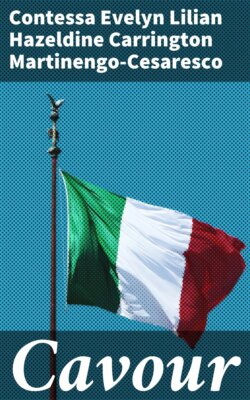Cavour

Реклама. ООО «ЛитРес», ИНН: 7719571260.
Оглавление
contessa Evelyn Lilian Hazeldine Carrington Martinengo-Cesaresco. Cavour
Cavour
Table of Contents
PREFACE
SALÒ, LAGO DI GARDA. CHAPTER I HEREDITY AND ENVIRONMENT. CHAPTER II TRAVEL-YEARS. CHAPTER III THE JOURNALIST. CHAPTER IV IN PARLIAMENT. CHAPTER V THE GREAT MINISTRY. CHAPTER VI THE CRIMEAN WAR—STRUGGLE WITH THE CHURCH. CHAPTER VII THE CONGRESS OF PARIS. CHAPTER VIII THE PACT OF PLOMBIÈRES. CHAPTER IX THE WAR OF 1859—VILLAFRANCA. CHAPTER X SAVOY AND NICE. CHAPTER XI THE SICILIAN EXPEDITION. CHAPTER XII THE KINGDOM OF ITALY. CHAPTER XIII ROME VOTED THE CAPITAL—CONCLUSION. CHIEF AUTHORITIES. CHAPTER I
HEREDITY AND ENVIRONMENT
CHAPTER II
TRAVEL-YEARS
CHAPTER III
THE JOURNALIST
CHAPTER IV
IN PARLIAMENT
CHAPTER V
THE GREAT MINISTRY
CHAPTER VI
THE CRIMEAN WAR—STRUGGLE WITH THE CHURCH
CHAPTER VII
THE CONGRESS OF PARIS
CHAPTER VIII
THE PACT OF PLOMBIÈRES
CHAPTER IX
THE WAR OF 1859—VILLAFRANCA
CHAPTER X
SAVOY AND NICE
CHAPTER XI
THE SICILIAN EXPEDITION
CHAPTER XII
THE KINGDOM OF ITALY
CHAPTER XIII
ROME VOTED THE CAPITAL—CONCLUSION
CHIEF AUTHORITIES
Отрывок из книги
contessa Evelyn Lilian Hazeldine Carrington Martinengo-Cesaresco
Published by Good Press, 2019
.....
One passage in Cavour's early life was revealed a few years ago, and, whether or not it was right to reveal it, the portrait would be now incomplete which did not touch upon it. The episode belongs to the critical psychological moment in his development: the time immediately after he left the army, and before he found an outlet for his activity, and, what was more essential to him, a purpose and an object not in the distance but straight before him, in the care of his father's acres. His position at home was not happy; his brother's small children were of more importance in the household than himself, and when Cavour once administered a well-merited correction to the much-spoilt eldest born, the Marquis Gustave threw a chair at his head. Between the brothers in after life there prevailed remarkable and unbroken harmony, but it is easy to see that when first grown to manhood Gustave presumed rather selfishly on his rôle of heir, while Camille took too seriously the supposed discovery that he was "necessary to no one!" Beyond all this, there was the undeclared clash of the new with the old, the feeling of having moved apart, which produces a moral vacuum until, by and by, it is realised that the value of the first affections and ties depends precisely on their resting on no basis of opinion. Cavour was overwhelmed by a sense of isolation; if he decided "like Hamlet" (so he writes in his diary) to abstain from suicide, he believed that he wished himself heartily out of the world. To his family he seemed an abnormal and unnatural young man. A conversation is on record which took place between the two childless aunts who lived with the Cavours. The date was just before Cavour's departure on a first visit to Paris. "Did you remark," said Mme. Victoire, "how indifferent Camille seemed when I spoke to him of the Paris theatres? I really do not know what will interest him on his travels; the poor boy is entirely absorbed in revolutions." "It is quite true," replied Mme. Henriette; "Camille has no curiosity about things, he cares for nothing but politics." And the two ladies went on to draw melancholy prognostics from their nephew's study of political economy, "an erroneous and absolutely useless science."
A charming countess who had made a favourite of Cavour in his boyhood tried to extract a promise from him that he would never again mix himself up in politics; he refused to give it; sooner or later, he writes in his diary, she would have blushed for him had he consented. But, he adds bitterly, what was the good of demanding such a promise from one for whom politically everything was ended? "Ah! if I were an Englishman, by this time I should be something and my name would not be wholly unknown!" Here, again, was a source of depression. At the Military Academy he had formed one almost romantic comradeship with a delicate and reserved youth, some years older than himself, Baron Severino Cassio, to whom he first confided his determination to Italianise himself: to study the language, history, laws, customs of the whole country with a view to preparing for the future. Cassio presciently marked out for his friend the part of architect, not of destroyer, in that future; architects, he said, were what was most wanted in public affairs, and Italy had always lacked them. There is no reason to think that Cassio's sympathy had chilled, but Cavour, in his morbid state, thought that it was so; he imagined that what had drawn Cassio to him "was not I, but my powerful intellectual organisation"; and with undeserved mistrust he did not turn to him for comfort.
.....